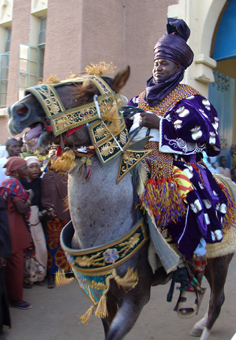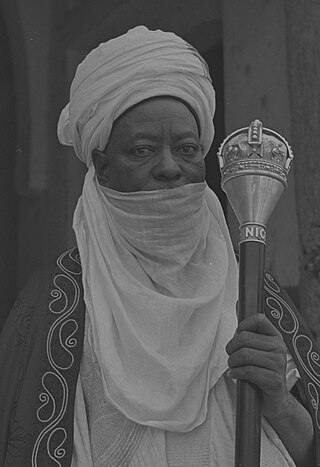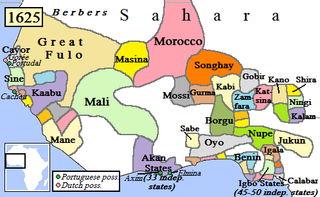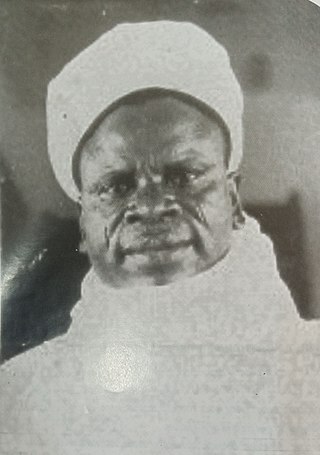Related Research Articles

Ilorin is the capital city of Kwara State located in the North-central region of Nigeria, although dominated by Yorubas, it is classifiedas North-central state due to its emirate system of traditional rule. As of the 2006 census, it had a population of 777,667, making it the 7th largest city by population in Nigeria.

Northern Nigeria was an autonomous division within Nigeria, distinctly different from the southern part of the country, with independent customs, foreign relations and security structures. In 1962, it acquired the territory of the British Northern Cameroons, which voted to become a province within Northern Nigeria.

Ado Bayero CFR, LLD, JP was the Emir of Kano from 1963 to 2014.

Pategi or Patigi is a town and local government in Kwara State, Nigeria with the headquarters located at the town. The town is the headquarters of Pategi Emirate. It is inhabited by the Nupe people who speak the Nupe language. They are farmers, aquatic sellers/fishers and traders. They are known to be governed by a monarch.

Katagum is a town, a local government area and a traditional emirate in Bauchi State of north eastern Nigeria. The town is located on the northern bank of the Jama'are River, which is a tributary of the Hadejia. Most of the inhabitants are peoples from the Fulani, Kanuri, Karai-karai and Hausa tribes. The chief agricultural products include peanuts (groundnuts), sorghum, millet, rice, cowpeas, cotton, indigo, and gum arabic. Livestock include horses, cattle, goats, sheep, donkeys and a lot of poultry.

The Durbar festival is an ancient traditional annual Hausa; cultural, religious and equestrian festival, celebrated as a core part of the Arewa Hausa culture. Durbar has existed for centuries and is as an essential part of Hausa kingdom and Hausa tradition. Durbar is a paramount part of Hausa cultural rites, tradition and history and the Hausa's are renowned in history as ancient horsemen and warriors of the Sahara and the Sahel.

Alhaji Abdullahi BayeroCBE CMG dan Muhammad Abbas (1881–1953) was Sarki (Emir) of Kano, with headquarters in Kano, Kano State, Nigeria from 1926 to 1953. As a traditional ruler he had extensive powers under the British colonial authority.
Omupo or Omu-ipo is an ancient Igbomina-Yoruba town situated in the southeastern part of Kwara State. It is one of the prominent towns in Ifelodun Local Government Area of the State. It is the headquarters of 34 communities of Omupo District, the headquarters of Omupo/Idofian Area Council of Ifelodun Local Government. Omupo Constituency was also created in 1979 for a representative to the Kwara State House of Assembly.
The Lapai Emirate, today in Nigeria, is a traditional state that lies near the Gurara River, a tributary to the Niger River, formerly originally inhabited where Gbari People, and presently came under the power of Nupe people, covering roughly the same area as the modern Lapai local government area.

Nigerian traditional rulers often derive their titles from the rulers of independent states or communities that existed before the formation of modern Nigeria. Although they do not have formal political power, in many cases they continue to command respect from their people and have considerable influence in their community.

The Potiskum Emirate is a traditional state in Nigeria, with headquarters in Potiskum, Yobe State. The emir holds the title "Mai".

TheGombe Emirate is a traditional state in Nigeria that roughly corresponds in area to the modern Gombe State.The current Emir of Gombe is Alhaji Abubakar Shehu Abubakar III, who acceded on 6 June 2014. The late Emir of Gombe, Alhaji Shehu Usman Abubakar, who precedes his father Abubakar II had been Emir since August 1984.
The Ilorin Emirate is a traditional state based in the city of Ilorin in Kwara State, Nigeria. It is largely populated by the Yoruba-speaking people, though the kingdom is a hybrid state due to the influence of the many other tribes that make up the city.
The Kebbi Emirate, also known as the Argungu Emirate is a traditional state based on the town of Argungu in Kebbi State, Nigeria. It is the successor to the ancient Hausa kingdom of Kebbi. The Emirate is one of four in Kebbi State, the others being the Gwandu Emirate, Yauri Emirate and Zuru Emirate.
Alhaji Dr. Muhammadu Kabir Usman was the 49th Emir of Katsina from 18 March 1981, until his death in March 2008. He was the tenth Fulani emir, as well as the third emir from the Sullubawa dynasty. He succeeded his father Usman Nagogo, and was succeeded by his son, the current emir Abdulmumini Kabir Usman.

The Kano Emirate Council is a traditional state in Northern Nigeria with headquarters in the city of Kano, the capital of the modern Kano State. Preceded by the Emirate of Kano, the council was formed in 1903 after the British pacification of the Sokoto Caliphate. The borders of the Emirate are contiguous with Kano State.
Ibrahim Sulu-Gambari ascended the throne as the 11th Emir of Ilorin and Chairman Kwara State Traditional Rulers Council since 1995 following the demise of his uncle, Mallam Aliyu AbdulKadir. He relinquished his position as the Presiding Justice of Court of Appeal, Lagos Division to become the Custodian of the Shehu Alimi dynasty. He is one of the 10 prominent traditional rulers in northern Nigeria.

Alhaji Yahaya Madawaki, MFR, OBE, DLL and holder of King George VI Coronation Medal was a prominent Nigerian politician, former Minister of Health, the Madawaki of Ilorin and the Atunluse of Erin-Ile, Kwara State.
Ja'afari Dan Isiyaku was the sixteenth Emir of Zazzau, he reigned from 1937 to 1959. As Emir of Zazzau he was administrative head of Zaria Emirate Native Authority which consisted of seventeen districts and he was responsible for the maintenance of law and order within the emirate.

Dutse Emirate is a historical emirate council in Jigawa State, Nigeria. It traces its origins back to legends of early hunters and has been influenced by various rulers and events. The emirate's history includes connections to the Sarkin Kano, periods of Fulani ascendancy, and adaptation to colonial-era changes. The current emir of Dutse is Hameem Nuhu Sanusi.
References
- ↑ "Abdulkadir Dan Bawa". frontend. Retrieved 16 January 2022.
{{cite web}}: Check|url=value (help)[ dead link ] - ↑ Jimoh, L. A. K. (1994), Ilorin: The journey so far, Ilorin, Nigeria: L.A.K. Jimoh, pp. 245–247[ self-published source ]
- ↑ Omoiya, S. Y. "The Survival of an Emirate System in a Multicultural Society: A Study of Ilorin Emirate in the 20th Century" (PDF). In Edeko, S. E. (ed.). Law and Contemporary Issues. Archived from the original (PDF) on 20 December 2016. Retrieved 8 February 2016– via University of Ilorin.